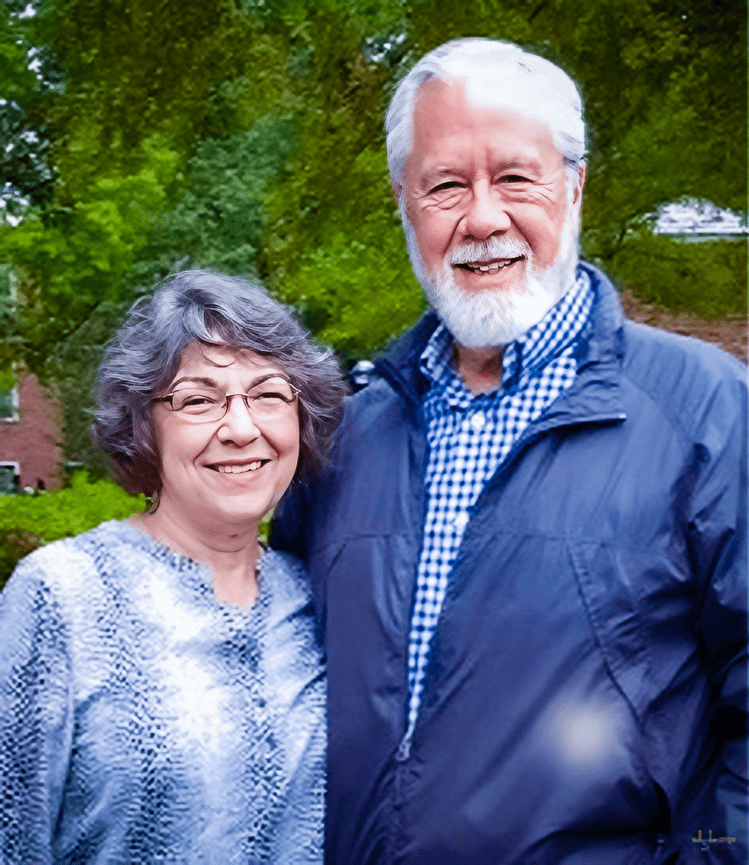Introduction
About forty years ago, five years into the life of the Boston Church of Christ (https://www.bostonchurch.org) and its many mission plantings in our fellowship of the International Churches of Christ, Pat Gempel created a women's anthology, written by women on the front lines of faith, entitled The Upward Call.
Last year, Pat and her friend Amanda Frumin were inspired to republish this volume, with two main goals in mind: to issue once again an Upward Call for Christian women to be actively engaged in teaching one another the principles of Biblical discipleship to Jesus and spiritual formation; and to raise money for the Philadelphia-based youth camp, Camp Hope for Kids, (https://www.hopeforkids.org/programs) a life-changing place of miracles for young people.
Response to "Developing Our Talents"
By Elizabeth Laing Thompson
When Marcia Lamb invited me to respond to her chapter, “Developing Our Talents,” my heart thrilled to the topic. Few things bring me more joy than watching God’s people honor him with their gifts! My memory immediately sprang back to a favorite memory, a time when my local church family collectively offered their talents to the Lord and to each other.
It was a muggy Saturday morning. I wrangled my bedhead hair into a ponytail, threw on some sweats, poured myself a ginormous to-go cup of coffee, and herded my three half-awake teenagers and one been-bouncing-off-walls-for-three-hours-already nine-year-old into our minivan. Minutes later, we pulled into the YMCA where our church worships on Sundays. Most of our church family was already there—also in sweatpants, also chugging coffee—and hard at work prepping for the next day’s tenth-anniversary worship service.
Later that afternoon, dozens of guests would begin arriving for a weekend of celebration, remembrance, and dreaming, but first we had a lot of work to do. And that work was well underway. For a moment I just stood in the doorway, drinking in the messy-beautiful scene:
Diane was directing a team of people as they hung her handmade number “10” above the stage.
Kimberly was assembling centerpieces and simultaneously teaching a gaggle of eager young girls how to decorate too.
Cassidy was using her knack for calligraphy to design nametags.
The tech team was taping down wires and testing microphones.

Teenage boys were moving chairs.
My kids and I found places to pitch in, and we set to work. The whole church labored together for hours, our laughter and excitement making the time fly. We all headed home tired, but the good kind.
That evening, some of us gathered to host a dinner for our out-of-town guests, and one of our members, Lance, prepared a low-country boil. He bustled over steaming pots of corn, potatoes, sausage, and shrimp till he glowed—and it was more than just steam making his face shine: it was joy. At the end of the night, as my husband tried to thank Lance for his hard work, Lance interrupted him to say, “No, brother, thank you for asking me. It was an honor to be able to use my gifts for God like this.”
The next morning, we worshipped till our eyes leaked and our hearts soared. The music was epic, the sermon inspiring, the fellowship rich—but honestly? As much as I enjoyed the Sunday service, it wasn’t my favorite part of the weekend. The highlight for me had come Saturday morning, in all those behind-the-scenes hours when our church had lifted and decorated and organized and rehearsed side by side, using our many gifts for a communal purpose, a holy offering. I had seen—we all had experienced—Paul’s words from Ephesians 4:16 leaping off the page in living, breathing color: “From him the whole body, joined and held together by every supporting ligament, grows and builds itself up in love, as each part does its work.”
Many talents, one offering
I love how Marcia described all God can do with our talents. She wrote, “Talents that are submitted to God’s will and service can grow, benefit and develop the kingdom [of God].” That anniversary weekend, I saw just how much our individual gifts—our blessings—can also bless God’s kingdom… especially when we use them together.
The apostle Paul touched on this idea when he wrote these words to the church in Rome:
Therefore, I urge you, brothers and sisters, in view of God’s mercy, to offer your bodies as a living sacrifice, holy and pleasing to God—this is your true and proper worship…. Just as each of us has one body with many members, and these members do not all have the same function, so in Christ we, though many, form one body, and each member belongs to all the others. We have different gifts, according to the grace given to each of us. (Romans 12:1, 4-6)
Although God sometimes asks us to exercise our gifts quietly and alone, with none but him to witness our efforts, other times—such as my church’s anniversary weekend—he invites us to put our gifts to work alongside others’, our many talents rising to heaven as a single fragrant offering, a pleasing sacrifice. In those moments, we taste the exquisite joy of being one body, united in heart and purpose.
Every talent can be “spiritual”
The nation of Israel experienced a glorious, using-their-talents-together moment in the book of Exodus. God entrusted Moses with a detailed plan for building a tabernacle, an elaborate tent where God’s Presence would dwell and his people would worship. The design and construction would require all kinds of skills: weaving, dyeing, gem cutting, woodworking, metalworking, architecture, making fragrances, and more.
One of my favorite parts of this story comes in chapter 31. God told Moses,
“See, I have chosen Bezalel son of Uri, the son of Hur, of the tribe of Judah, and I have filled him with the Spirit of God, with wisdom, with understanding, with knowledge and with all kinds of skills—to make artistic designs for work in gold, silver and bronze, to cut and set stones, to work in wood, and to engage in all kinds of crafts. Moreover, I have appointed Oholiab son of Ahisamak, of the tribe of Dan, to help him. Also I have given ability to all the skilled workers to make everything I have commanded you.” (vv. 2-6)
God had chosen Bezalel to do specific work with precious metals and gems, and he had “filled him with the Spirit of God, with wisdom, with understanding, with knowledge and with all kinds of skills.” Bezalel had probably learned his trade when he was still a slave in Egypt—perhaps an Egyptian master had chosen this profession for Bezalel when he was just a boy. In that moment, Bezalel probably didn’t feel chosen or appointed by God. Maybe Bezalel spent years making jewels for wealthy Egyptians; I wonder if young Bezalel ever worried that his work was frivolous or materialistic. And yet God had great plans for Bezalel’s gifts. All the long hours Bezalel spent apprenticing under an expert, bending over flames—making mistakes and starting again, mastering his craft—Bezalel had no idea that God was preparing him to perform a sacred work.
And Bezalel wasn’t the only person God had equipped for the great work of building the tabernacle; he’d also appointed Oholiab to help, and in verse six God added, “I have given ability to all the skilled workers to make everything I have commanded you.” Here in this unique moment, all these men and women got to offer their skills to God in a once-in-a-lifetime way. Their story does not imply that our gifts only have value when they are used directly for a church or in a religious setting—but this moment illustrates how God finds good purposes for all types of talents and skills, and he is delighted when we use them wholeheartedly.
I invite you to have fun dreaming about ways you might offer your skillset to God. How might you worship him as you use your gifts? How might your talents bless others? Whether your gifts are financial or culinary, artistic or athletic, architectural or emotional, God can help you discover good purposes for your talents.
Conquering envy, embracing your gifts
Even when we know (intellectually, theoretically) that our talents are gifts from God, we still sometimes struggle to find the confidence and conviction to use them. One of my favorite insights from Marcia’s chapter is this: “Human treasure chests of divine gifts lie buried in the sands of neglect and fear, frustrating both God and ourselves.”

What a heartbreaking image: God’s precious gifts buried in a box: unopened and unused, gone to rust and decay. And why do we neglect our gifts like this? Fear, insecurity, selfishness, laziness… our reasons and excuses could run long. But you know what I’ve noticed? Many times we neglect our gifts because we just don’t think they are special. Our talents come easily to us, so we take them for granted. It may sound something like this:
The girl with the gift of encouragement says, “Encouraging people isn’t a talent! Can’t everyone make other people smile? I wish my gift was more tangible, more… exciting.”
Meanwhile, Encouragement Girl’s roommate constantly fumbles over her words and hurts people’s feelings because she misses social cues. She would give her right pinky toe to learn how to connect with people the way her roommate can!
And then the girl with the gift of organization shrugs her skill off as “boring” and “not exactly spiritual.” But meanwhile, her dear friend’s life is falling to pieces because she can’t find any of her stuff, and her calendar keeps running away from her screaming. If only she had an organized friend to help her out…
See how that works? We are tempted to undervalue and dismiss things that come easily to us. And you know what else I’ve noticed in my own heart? Sometimes the my-gifts-aren’t-that-special feeling may sour into something truly rancid: discontent and envy. We start wishing we had different gifts. Instead of enjoying and expanding the gifts God has given us, we stress and obsess over the talents we wish he had chosen for us.
When I was a girl, I dreamed of athletic glory. I was gritty, strong, and reasonably coordinated, but not to an impressive degree. I was rarely the best at any sport, and my mediocrity frustrated my competitive little soul. But you know what I was really good at? Reading. Grammar. Spelling. Storytelling. I could regale you with a thousand things you never wanted to know about when to use a comma, semicolon, or em dash. (Yeah. There’s such a thing as an em dash. Also an en dash. Fascinating, right? Right?!) But alas, no one gets a gold medal for proper punctuation—you don’t even get to wear a cool uniform and cleats while you do it—and so Little Elizabeth remained vaguely underwhelmed by her gift set. It wasn’t until my mid-twenties that I fully embraced my calling to work with words—to serve others with words—in a variety of ways. Sometimes I write fiction, sometimes nonfiction; sometimes for churches, other times for businesses; sometimes I put words on paper, other times I speak them into a microphone. I still haven’t won any medals, but the fulfillment writing brings me is golden just the same.
As much as I celebrate the moments when I get to serve alongside other believers, offering our combined gifts to God, my work is sometimes secular, and often solitary. Using our talents with other Christians or in a church setting isn’t the only way, or even the “most righteous” way, to devote them to the Lord. We may serve quietly at home, with God as our only witness. We may humbly offer a skill to serve a neighbor or friend. We may help our workplace become more healthy or successful. We may anonymously meet a need in our community. Our talents can serve God’s purposes privately or publicly; backstage or center stage; at church or at home; for fun or for pay. However and wherever God calls us to use our talents, when we answer his call, we honor him.
Feeling God’s pleasure
The 1981 movie Chariots of Fire depicts the inspiring story of Eric Liddell, a missionary who was also an Olympic sprinter in the 1920s. In one scene, Eric’s sister Jenny expresses disappointment that he is wasting so much time running; she thinks he should devote all of his energies to the mission field in China. But Eric tells her, “I believe God made me for a purpose—for China. But he also made me fast. And when I run, I feel his pleasure.”
When you dig up your treasure chest, dust off the dirt, unbox your gifts, and put them to use, oh, how happy it makes God. And how happy it makes you! You feel alive, useful, and in tune with your Creator.

Whatever God has called you to do, however he has gifted you, I pray you give it back to him with your heart, your soul, and your best effort. Get better. Learn more. Do it often. Do it with absolute, beside-yourself glee. And give it away however you can:
- Bake cakes so mouthwatering people praise God for creating taste buds.
- Bang drumbeats that make people dance with pure joy.
- Paint sunsets that mirror God’s art in the sky.
- Teach exercise classes that make muscles grow and endorphins flow.
- Organize a friend’s pantry and make her daily life a little less stressful.
- Teach children to read words, so one day they can read the Word.
Like Bezalel, I pray you offer God the best of your skills—and all of your heart.
Like my church family, I pray you savor opportunities to share your gifts alongside others.
And like Eric Liddell, I pray you feel God’s pleasure as he watches you shine.

Elizabeth (Lizzy) Laing Thompson, responding to Marcia Lamb, "Developing Our Talents"
Lizzy was born in Gainesville, Florida and is the oldest daughter of Sam and Geri Laing’s four children. During her middle and high school years, the Laing family moved up and down the East coast serving different churches. They landed in North Carolina, and Elizabeth attended Duke University, where she began dating Kevin Thompson. They graduated in 1999 and entered the full-time ministry together. They have led campus ministries at Duke, UNC-Chapel Hill, North Carolina, North Carolina State, Georgia Tech, the University of Georgia, Gainesville State College, and now UNC-Wilmington.
She is a speaker and novelist, and the author of many inspirational books for women and teens, including All the Feels, All the Feels for Teens, and When God Says series. She writes to help others find hope when they’re waiting, help when they’re hurting, and humor in holiness. Her work has appeared in numerous outlets including Proverbs 31, Power for Living, Focus on the Family Magazine, and Brio Magazine.
After a long struggle with infertility, Elizabeth and her husband, Kevin, became the always exhausted but totally grateful parents of four children, three of whom are now teenagers. When she’s not inhaling Starbucks mochas and plotting her next book, Elizabeth works from home as an editor and church volunteer (preacher’s wife), and as a snack maker, laundry slayer, floor sweeper, not-so-gourmet chef, and interpreter-slash-counselor of teenage feelings. She prays the lessons she is learning, trying to wrestle Christ into the chaos of daily life, will give others hope, practical help and a lot of good laughs. You can find her online at ElizabethLaingThompson.com.
In 2012, the Thompsons moved to North Carolina coast with a small mission team to plant the Greater Wilmington Church, and they have devoted themselves to serving their church and local community ever since. The Thompsons have four children, Cassidy, Blake, Avery and Sawyer.
Developing Our Talents
by Marcia Lamb
Talents are God-given abilities that enable us to be more effective and productive people. Talents that are submitted to God’s will and service can grow, develop and benefit the kingdom. Without godly confidence, however, our talents may lie dormant. Consider for a moment the parable of the talents (Matthew 25:14-30).
A pitiful little man walks apprehensively through the large, majestic corridor of his master’s palace. He has been summoned to his master’s chamber to give an account of the loan the master gave him years ago. The man couldn’t even remember such a transaction. “Surely, there’s been a mistake,” he thought. “I don’t remember ever receiving any talents. Why, if I had received a talent, I’m sure I would have kept it in a prominent place.” Then a cold chill ran through his body as he recalled the damp, dark night that he buried the talent in his own backyard.

Now he is in the master’s chambers, clenching the tarnished talent as he listens to other servants give account to the master. His thoughts reveal attitudes that were buried and tarnished as well. “This is such a small talent compared to the others. It wasn’t fair that I didn’t get more. Oh, well, who wants more talents anyway. It would just have meant more work. I know the way things happen when my master makes investments. Things inevitably grow and multiply. Keeping up with the interest would have been too much for one measly talent. I’d never get to do what I want to do. Who wants all that responsibility? Besides, what would I get out of it anyway? If he doesn’t like what I’ve done, it is his own fault. Who asked him for this talent anyway? He should have known better than to give it to me.”
“Master, I knew that you are a hard man, harvesting where you have not sown and gathering where you have not scattered seed. So, I was afraid and went out and hid your talent in the ground. See, here is what belongs to you.”
“You wicked, lazy servant...Take the talent from him and give it to the one who has the ten talents. For everyone who has will be given more, and he will have an abundance. Whoever does not have, even what he has will be taken from him. And throw that worthless servant outside, into the darkness, where there will be weeping and grinding of teeth.”
How much we are like this pitiful man in Matthew 25 until we realize that our talents are gifts from God. What an honor it is to be used in his service and to his glory. No matter how large or small our talent, we have a responsibility to use what he has given us. Many of us have the desire to be used by God in a special way, to fulfill the individual purpose he has for each of our lives. Oftentimes, however, we fail to see and develop the talents and abilities God has given us to accomplish those purposes. Human treasure chests of divine gifts lie buried in the sands of neglect and fear, frustrating both God and ourselves.
Ephesians 2:10 teaches that “we are God’s workmanship, created in Christ Jesus to do good works, which God prepared in advance for us to do.”
We must realize that we are God’s workmanship and that he will hold us accountable for the way we use or don’t use the gifts he has given us, just as the master did his servants in the parable of the talents (Matthew 25:14-30). Considering that fact, we will explore four areas of our “treasure hunt” for hidden talents: recognizing our talents, burying our talents, using our talents and enhancing our talents.
Recognizing Our Talents
Webster’s dictionary defines a talent as “a natural ability or power,” adding that the word connotes “it is or can be cultivated by the one possessing it.” A talented person can learn a skill quickly and easily because God has given him an innate head start in that area. Initially discovering what our natural talents are, however, may be more difficult. Fortunately, there are some clues to help us in our search.

Certain talents will be obvious, and parents, teachers and others will recognize them for us. Kim Evans’ parents (Bob and Pat Gempel) realized her talent as a pianist after a few months of her piano lessons. She quickly surpassed the skill of her brother Doug who had been pounding away at the keyboard for two years. To Doug’s relief, he was allowed to drop his lessons and pursue basketball. Kim was made to continue, even though there were times she hated practicing. Today, Kim is thankful to have developed a usable talent that brings joy to herself and others. We too should remain open to the guidance of mature adults who have a wider perspective on life. They can see the long-range development of our talents.
Sometimes we discover our talents by trial and error. How many of us remember the sudden realization that we were not slated to be artists when someone in art class thought our copy of the “Mona Lisa” was a basset hound? Keep trying out your various interests. The process of elimination will reveal where your native abilities lie.
Other talents become apparent when one tries to meet a need that arises. I know a young man in DeKalb, Illinois, who had developed a skill for sign language. Mike Rawls is not deaf, but he learned sign language to communicate with deaf visitors at church. Now two deaf men are Christians and others are being studied with because of Mike learning a needed skill.
Another way we can recognize our talents is by honestly and humbly listening to compliments we receive. What do your friends perceive as your natural abilities? Observe yourself. What do you enjoy doing? What comes easily to you? What new activity haven’t you tried?
The parable of the talents shows us that we all have at least one talent. Most of us have many. Decide right now to discover what yours are in order that your life may more fully glorify God.
Burying Our Talents
In the parable of the talents, the servant who buried his talents was rejected by God. Far too many of us have fallen into this trap – regarding our talent as too small, we have buried it in oblivion’s backyard. There are several ways we do this. Proverbs 13:7 states that “one man pretends to be rich, yet has nothing; another pretends to be poor, yet has great wealth.” A false humility can keep us from searching for our talents and using them to the fullest. That kind of attitude needs to be exposed for what it is—inverted pride. Pride will cause our talents to be utterly useless as it did for Jerusalem in Jeremiah 13:8-11. Do you think you can’t learn more about your talent? When someone challenges you on how you’re using your talent, do you get defensive because they don’t understand the demands of your field? For example, a vocalist can learn how to sing her best from a Christian who is tone deaf but knows what it means to sacrifice. In the same way, a fisherman learned how to get a great catch from an itinerant preacher (Luke 5:1–11).
If our pride causes us to boast about what we’ve accomplished, forgetting the fact that the Lord has accomplished it, then we need to remember 1 Corinthians 4:7 — “Who makes you different from anyone else? What do you have that you did not receive? And if you did receive it, why do you boast as though you did not?” People who drop big hints about their great talents, under the guise of assertiveness, are usually not called upon to serve. Why? Their pride prevents them from serving the best interests of others. They will seek honor for themselves and not God.
Our sacrifices to God must be holy and pleasing to him. A talent that is offered in an unholy manner is like the maimed and blind sacrifice God rejected in the Old Testament. Closely examine your attitude about your talents to see if it contains any unholy or inverted pride. Why have a great but useless talent?
Fear buries our talents even deeper. A certain amount of fear is good because it humbles us and reminds us to rely on God. Courage can blossom when a fear is faced and overcome. If we let fear reign, however, we will become paralyzed and unable to use our talents.
Fear is an obstacle that I’ve had to learn to overcome. At a retreat I attended a few years ago, the participants shared the strengths and weaknesses they saw in each other. My lack of boldness was pointed out by many. My first response was, “Oh well, what is new?” Then I felt the horror of what I had just thought, and I made a firm decision: If a lack of boldness was the weakness most people remembered me for, then it needed to change.
Improving my boldness became my emphasis. I prayed about it, studied, and sought advice. Little victories were won along the way. Then I was challenged like never before—I was asked to sing a lead part at the Midwest Evangelism Seminar. I knew that about 2,000 people would be there. The song was “Amazing Grace.” I knew the song needed to be sung with boldness and confidence. I spent hours praying and reading the words of the song imagining how Jesus would have sung Amazing Grace. He had seen me “through many dangers, toils and snares” and I was confident that “his grace would lead me home.” I wanted the audience to do the same.
The night of the concert I prayed for confidence, boldness and that the song’s message would be clear. The song received a standing ovation. Since then, I’ve learned to be bold in other areas of my ministry as well. I have been able to study the Bible with a senator’s wife, a registered nurse, and some social workers. All have become Christians. Submitting my talents and fears to God resulted in confidence flowing into my whole life.
We must overcome the fears that control us if we are to use any of our talents, especially those of teaching. When the fear of humiliation or rejection threatens to hold you back, remember the parable of the talents. The servant who complained about being afraid was explicitly told that was an excuse for being wicked and lazy.
Are you afraid your talents aren’t good enough? What you really mean is that you are too lazy and selfish to pray and work at improving them so God can use you. Do you leave projects half finished? Are you willing to push through the awkwardness of trying something new? Does discipline seem like a creativity killer to you. If your answer to any of those questions is yes, then your problem isn’t lack of talent; it’s laziness.
Using Our Talents
As we begin to recognize our talents (and realize what we need to change to be more like Christ) we begin to wonder how we can use them in God’s kingdom, the church. Often, we hear talents discussed as they are used in a worldly context. Romans 12:1-3 is an excellent guide on this subject: “Therefore, I urge you, brothers, in view of God’s mercy, to offer your bodies as living sacrifices, holy and pleasing to God—which is your spiritual worship. Do not conform any longer to the pattern of this world but be transformed by the renewing of your mind. Then you will be able to test and approve what God’s will is—his good, pleasing, and perfect will. For by the grace given me I say to every one of you: Do not think of yourself more highly than you ought, but rather think of yourself with sober judgment, in accordance with the measure of faith God has given you.”
We see here the proper attitude we need toward our talents and God’s will. It is in view of God’s mercy that we offer ourselves. We do not deserve his mercy, but he has freely given it to us. We freely offer ourselves in return.
The sacrifice we give God is living, vital and diligent in every aspect of our being. We release all claim or right to our talents, no longer governing our actions by what’s best for our talent but by what is best for the kingdom. Until we give our talents over to God’s ownership, they will never grow.
I remember how much I wanted to join the Chapel Singers when they were first organized. Music majors had told me that I had a good voice and would help the group. I also sought advice from church leaders. Their opinions were unanimous – I was needed more leading Bible studies, discipling sisters, and managing my home.
At first, I was disappointed. Then I was reminded that God would give me singing opportunities if that was a talent he wanted me to use. I accepted that advice and submitted to God and have been grateful ever since that I did. The Lord has allowed me to sing at some very special weddings and banquets; plus he gave me the great honor of doing a solo with the Chapel Singers at the seminar. I have found his promise in 1 Peter 5:6 to be true: “Humble yourselves, therefore, under God’s mighty hand, that he may lift you up in due time.”
Effectively using our talents for God also takes a renewed mind (Romans 12:2). The patterns of this world tell us to use our talents to gain honor for ourselves. John 7:17–18 says we won’t know God’s will that way nor will we be a person of truth. The world says do your best for the best pay. God says you can’t serve both him and money (Matthew 6:24). The world says use your talents for self-fulfillment. God says, “each one should use whatever gift he has received to serve others, faithfully administering God’s grace in its various forms” (1 Peter 4:10).
The world will tell you that God can’t use rock band musicians, but God has changed the lives of John Mannel and Bill Bennett. John became an elder and the director of the Chapel Singers. Bill used his experience to reach another rock singer who is now teaching a young adult Bible class. He also uses his talent in the homes of Christians as an outreach tool.
Objectivity about our talents is needed. Romans 12:3 warns us to have a sober judgment about our abilities, especially as they affect the church. If we have the talent to fulfill a need, we should soberly accept the responsibility. If we don’t, we need to honestly admit we don’t. However, sometimes God uses others to point out talents that we don’t recognize to be talents.
Romans 12:3 says: “In accordance with the measure of faith God has given you.” That means that our abilities can grow and develop as our faith grows and develops. God is in the business of turning our weaknesses into strengths (2 Corinthians 12:9-10). We have all seen people with little natural talent as a teacher or leader surpass those with a lot of natural ability. Their faith makes a difference.
Enhancing Our Talents
Romans 12:6-8 describes some of the different gifts that are present in the body of Christ. Though the text uses the term “gifts,” the word is not considered to be referring to the miraculous gifts of the Holy Spirit. Rather these are responsibilities we all have: teaching (Colossians 1:28), contributing to the needs of others (2 Corinthians 9:7), serving (John 13:14-15), encouraging (Hebrews 3:13), leading (Matthew 28:18-20), and showing mercy (Matthew 5:7).
Our natural talents can enhance these spiritual “talents” that God has given us and vice versa. For example, natural talents that enhance the spiritual gift of teaching are orderly thinking, good speaking ability and high intellect. It is sad to see excellent schoolteachers withhold those talents in the Lord’s church. The older married women set up weekly classes for new brides. One sister who excelled in cooking taught a cooking class. Another sister taught sewing, another bookkeeping, and the overall Biblical structure for the family (the book of Ephesians). Older, more experienced disciples should teach those who are just starting a family (the book of Titus).
We should share with others the gifts God has given. The ability to encourage can be seen in people who can create beautiful calligraphy notes and prints. Growing and arranging flowers is a gift of some. Acting is a gift. One new disciple said when attending a fellowship gathering, “I thought after I gave up going to bars that would be an end to fun for me. But I’ve enjoyed tonight more than anything I ever did in the world. It’s good to know the Christians can have fun.”
The gift of contributing to the needs of others is another important gift to develop and enhance with our talents. Needs that can be met may be physical, emotional, monetary, or spiritual. Every group of disciples has great cooks, who can share by giving prepared meals for groups or shut-ins. Financial gifts help the Lord’s work to advance. Praise God for our financial blessings. The widow who gave all she had to live on was praised by our Lord. That heart enables us to reach the world in our generation. He will take care of us now and for eternity.
The unity of the body is lubricated and held together by the selfless attitudes of servants who follow Christ’s example of washing the disciples’ feet (including Judas who left to betray Him) in John 13:15. Every disciple has a talent to give to the Lord. I will always be grateful for those who have served me. One young sister who helped me clean my house taught me how to organize my home. She shared with me with a joyful and efficient attitude. I shared with her some spiritual guidance. God gave us friendship and mutual benefits.
Jesus was our perfect leader. His example and his words teach us about how a disciple should lead others. We have a lot to learn about godly leadership. Some are talented leaders, naturally. Wherever you are in using your leadership talent, you can learn from our Lord. He was bold when speaking God’s will. He embraced those that wanted to learn from God. He spoke the truth of God to those who rejected him as the son of God. He called out their sin of lack of obedience to the scripture and lack of faith. Jesus met physical, emotional, and spiritual needs perfectly. He set us an example in his relationship with God, his prayer life, his treatment of others and his reliance on God to obey His plan. We have Matthew, Mark, Luke and John and the rest of the New Testament — and the Old Testament (which predicts his coming) to learn from.
Some of us have innate leadership talent which includes organization, goal setting, discipline, follow through, and persevering when things are difficult. Observe children at play. One will keep toys in a perfect row, others will scatter them, their objective is to scatter all of them. Jesus was a talented leader. He was challenged to set us a standard; he gave his life for us.
Satan tests and tries leaders. Jesus was tested in many ways. Satan works directly, and through our fellow human beings. Consider how painful it was for all the apostles, including Peter, to deny our Lord in His most important trial. The more talented you are the more Satan will test you. However, when you persevere to win the prize and God’s victory: you will have eternal life with Him in the presence of perfect love, joy, and peace. Ask yourself: what victories has God helped you to accomplish lately? How can you use your talents in God’s service? How do you need to grow?
Finally, pray and ask others, who know you well, what your talents are and how you can use them for God. Develop them with God’s direction. I pray that you will submit your talents to God’s service of helping others. God will bless you with His miracles as you look back on your life (Luke 6:38).

About Marcia Lamb
Marcia is an award-winning writer and playwright and former ministry leader who played an integral role in connecting International Churches of Christ (ICOC) disciples and congregations around the world as a writer and editor for KNN and Disciples Today. She has been married since 1968 to Roger Lamb, who spearheaded the launch of KNN and subsequently Disciples Today as the Director of Media for the ICOC for 30 years. Marcia has written for several KNN short films based on the parables of Jesus and “The Cross.” She also performed one-woman plays to large audiences in Chicago, Boston, Hollywood and on the Steps of the Apostles Tour. Her career includes being an assistant teacher and deaf interpreter in public schools for 10 years.
Marcia and Roger co-authored This Doesn’t Feel Like Love: Trusting God When Bad Things Happen (DPI), which shares lessons they learned about God’s love as they dealt with their son’s leukemia and Marcia’s own life-threatening cancer. Their newest book, This Doesn’t Feel Like Love Either (Illumination Publishers), deals with facing their personal grief and loss of family members, including two of their three children, David Lamb of Brown Bird musical fame and his sister, Christie Lamb. Their son Michael survived childhood leukemia and leads the Next Generation Ministry of the Boston Church of Christ with his wife Kristen.
God has turned challenges into opportunities for the Lambs to teach, counsel and conduct workshops in the United States and throughout the world. Their greatest joy is to discover more reasons to love and trust God and to inspire others to join in the treasure hunt.




0 Comments